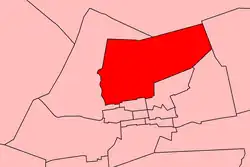Parktown (House of Assembly of South Africa constituency)
| Parktown | |
|---|---|
| Former constituency for the South African House of Assembly | |
 Location of Parktown within Johannesburg (1915) | |
| Province | Transvaal |
| Electorate | 18,010 (1989) |
| Former constituency | |
| Created | 1915 |
| Abolished | 1994 |
| Number of members | 1 |
| Last MHA | Zach de Beer (DP) |
| Created from | Braamfontein |
| Replaced by | Gauteng |
Parktown was a constituency in the Transvaal Province of South Africa, which existed from 1915 to 1994. It covered parts of the inner northern suburbs of Johannesburg centred on the suburb of Parktown. Throughout its existence it elected one member to the House of Assembly and one to the Transvaal Provincial Council.
Franchise notes
When the Union of South Africa was formed in 1910, the electoral qualifications in use in each pre-existing colony were kept in place. In the Transvaal Colony, and its predecessor the South African Republic, the vote was restricted to white men, and as such, elections in the Transvaal Province were held on a whites-only franchise from the beginning. The franchise was also restricted by property and education qualifications until the 1933 general election, following the passage of the Women's Enfranchisement Act, 1930 and the Franchise Laws Amendment Act, 1931. From then on, the franchise was given to all white citizens aged 21 or over. Non-whites remained disenfranchised until the end of apartheid and the introduction of universal suffrage in 1994.[1]
History
Like most of Johannesburg's northern suburbs, Parktown had a largely English-speaking and liberal electorate. Among other things, it was notable for being the first constituency to elect a woman - Leila Reitz - to serve in parliament, in 1933, at the first election after women were granted the vote. Reitz, like all her predecessors, was elected for the South African Party, and joined the United Party on its formation in 1934 - that party would supply her successors for thirty years after her resignation in 1943. In 1974, it was one of a handful of north Johannesburg seats to reject the UP in favour of the more outspokenly anti-apartheid Progressive Party, and in 1977 it elected its final MP - Zach de Beer, who at the time represented the Progressive Party's successor, the Progressive Federal Party. In 1988, de Beer became leader of the PFP, and went into the final whites-only general election as co-leader of the new Democratic Party, which aimed to unite the liberal opposition to the governing National Party - this met with only marginal success, but de Beer held his seat by a strong margin, and represented it until the end of apartheid.
Members
| Election | Member | Party | |
|---|---|---|---|
| 1915 | Richard Feetham | Unionist | |
| 1920 | |||
| 1921 | SAP | ||
| 1923 by | Willie Rockey | ||
| 1924 | |||
| 1929 | |||
| 1933 | Leila Reitz | ||
| 1934 | United | ||
| 1938 | |||
| 1943 | J. R. Stratford | ||
| 1948 | E. J. W. Henderson | ||
| 1953 | J. P. Cope | ||
| 1958 | |||
| 1961 | Samuel Emdin | ||
| 1966 | |||
| 1970 | |||
| 1974 | R. M. de Villiers | Progressive | |
| 1977 | Zach de Beer | PFP | |
| 1981 | |||
| 1987 | |||
| 1989 | Democratic | ||
| 1994 | Constituency abolished | ||
Detailed results
Elections in the 1910s
| Party | Candidate | Votes | % | ±% | |
|---|---|---|---|---|---|
| Unionist | Richard Feetham | 2,001 | 80.3 | New | |
| National | Oswald Pirow | 299 | 12.0 | New | |
| Labour | A. W. Barlow | 192 | 7.7 | New | |
| Majority | 1,702 | 68.3 | N/A | ||
| Turnout | 2,492 | 74.4 | N/A | ||
| Unionist win (new seat) | |||||
Elections in the 1920s
| Party | Candidate | Votes | % | ±% | |
|---|---|---|---|---|---|
| Unionist | Richard Feetham | Unopposed | |||
| Unionist hold | |||||
| Party | Candidate | Votes | % | ±% | |
|---|---|---|---|---|---|
| South African | Richard Feetham | Unopposed | |||
| South African hold | |||||
| Party | Candidate | Votes | % | ±% | |
|---|---|---|---|---|---|
| South African | Willie Rockey | 1,797 | 78.0 | N/A | |
| Labour | J. George | 208 | 22.0 | New | |
| Majority | 1,289 | 56.0 | N/A | ||
| Turnout | 2,305 | 61.2 | N/A | ||
| South African hold | Swing | N/A | |||
References
- ^ "EISA South Africa: Historical franchise arrangements". Eisa.org.za. Archived from the original on 9 May 2013. Retrieved 6 July 2012.
- ^ a b Schoeman, B.M. (1977). Parlementêre verkiesings in Suid-Afrika 1910-1976. Pretoria: Aktuele Publikasies.
- ^ Standard Encyclopaedia of Southern Africa (1972). "House of Assembly" (vol. 5, pp. 617–636). Cape Town: Nasionale Opvoedkundige Uitgewery (Nasou).
- ^ South Africa 1980/81: Official Yearbook of the Republic of South Africa. Johannesburg: Chris van Rensburg Publications.
- ^ South Africa 1983: Official Yearbook of the Republic of South Africa. Johannesburg: Chris van Rensburg Publications.
- ^ Government Gazette of South Africa, No. 10751. 22 May 1987. Pretoria: Government of South Africa.
- ^ Government Gazette of South Africa, No. 12109. 20 September 1989. Pretoria: Government of South Africa.
- ^ Government Gazette of South Africa, No. 13061. 15 March 1991. Pretoria: Government of South Africa.